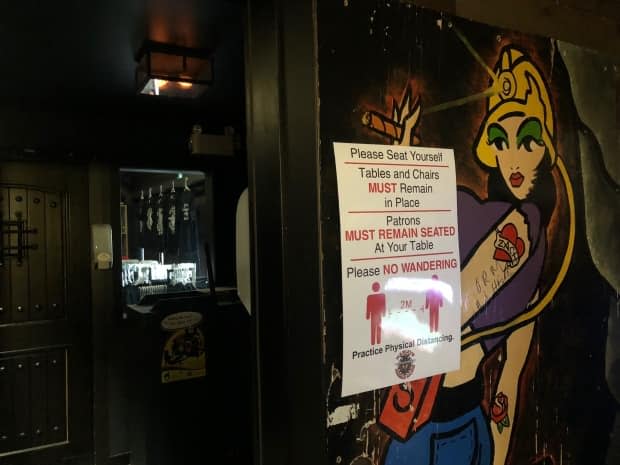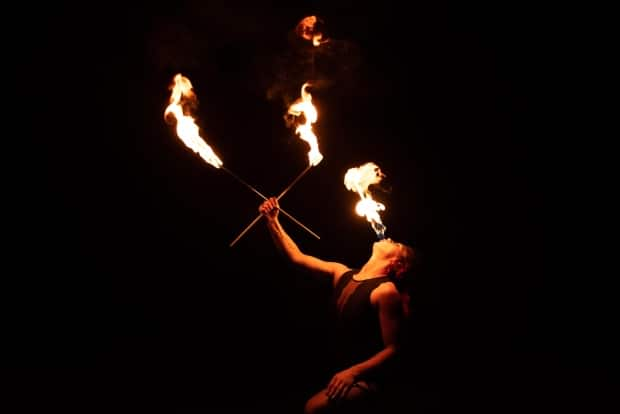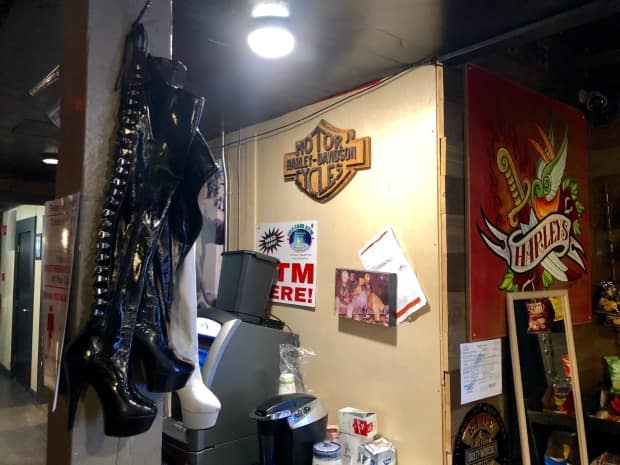How dancers feel about return to work in Canada's 'Northernmost' strip club
The stage in what is known as Canada's "northernmost" strip club has been dark for months.
But come Monday the lights will be back on. The bar was recently approved to bring dancers back to the Northwest Territories, after months of paperwork and phone calls between the owner and the territorial government.
Harley's Hardrock Saloon in Yellowknife outsources all of its performers from southern provinces, who work on a rotating schedule — visiting different cities nearby in Alberta, B.C., and Manitoba.
Desarae is one of the first two dancers to come back to Yellowknife since March, before the pandemic she would come to the city a few times a year. CBC is only naming her by one name for her protection.
She, along with another dancer, is now isolating and will be back on the stage next week.
"I'm absolutely ecstatic. This is one of many dancers' favourite gigs," she said. "I'm very very happy to be up here again working."
She is from B.C. where nightclubs were ordered to be closed last month, and has only been booked twice since March.

Milani, who CBC is also identifying by one name for the same reasons, is the other dancer currently isolating in Yellowknife.
She decided to come up North to work after recently losing three weeks of work in Cranbrook, B.C. due to reduced hours and nightclub closures in that province.
In her home province of Alberta, she said clubs are slowly reopening but they are already booked until December.
"I would rather sit here for two weeks and work here than sit at home and spend money and not know when I'm going to work. At least here … I know that I've got work."

Months of correspondence with gov't
Since July, Scott Yuill, the owner of Harley's, has been calling and emailing Protect NWT, laying out his safety plans, and trying to bring back the dancers to what he says is Canada's "northernmost" strip club.
He estimates that about 75 to 80 per cent of the business' revenue comes from dancers.
"I've been constantly filling out paperwork … sending the same stuff, it has been a repetitive process."
A couple weeks ago his plan to have the live performances at his business was approved, he said, after filling out the proper WSCC forms, and setting out certain health protocols.
The plan includes having the dancers self-isolate in staff housing, customers staying at the table, no touching the dancers, tips being left on the tables, and performers staying downstairs until their performance time.

The dancers are considered non-resident workers and are required to follow standard self-isolation protocols.
Mike Westwick, spokesperson for the territorial government, said the business needs to demonstrate how the procedures around dancing "will be altered to address higher-risk activities."
The territory considers higher risk activities involved to be onstage tipping and private dances, both of which will not be allowed under the newly approved plan.

Some restrictions could be 'very difficult'
The two week isolation protocols could potentially cause problems for Yuill, including the possible need to rent out an additional apartment for his employees to quarantine in.
Isabelle, who is also being identified by CBC with one name for protection purposes, is one of the dancers who has been hoping to come up North.
"There's hundreds of dancers in Western Canada and only a handful of places to work right now." - Isabelle, dancer based in British Columbia.
She said two weeks of unpaid isolation might not be possible for her.
"There's hundreds of dancers in Western Canada and only a handful of places to work right now ... so I'm appreciative we have the opportunity," said Isabelle.
"Some of the restrictions I know are going to be very difficult for Scott and Harley's and for the dancers ... I really want to go up, but financially it's probably not the best idea," said Isabelle.

She has been hoping to return to the North for months now, and said she is "very glad" it is being looked at and knows these things take time. But, she is also frustrated that it has taken months.
"Stripping isn't something that people care about much when it comes to resources and helping people out," said Isabelle.
Mike Westwick told CBC the timeline for these processes can be within the course of weeks, but it depends on "how many variables there are with a given activity or facility."

The 'very scary' future of strip clubs
Isabelle said she has seen a "huge increase" in the virtual sex industry, which has created more competition for dancers with so many flooding the market by joining online services such as OnlyFans.
In Ontario, strip clubs have been ordered to close across the province for the time being, and many clubs are closed indefinitely elsewhere.
Yuill said the future of exotic dancing after the pandemic is "very scary" and hard to predict.
"This is a dying industry," he said.
Elsewhere in Canada, several strip clubs have had incidents of possible COVID-19 exposures. But with zero active cases in the N.W.T., Yuill is confident that Harley's can be a safe location and reduce risk by following health protocols.
"We are going to make an effort to see how this works. Right now this is a trial run for us, if it doesn't pay off then we'll have to stop having dancers here."


